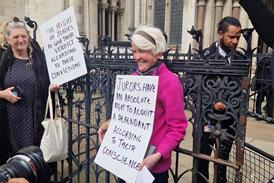A barrister who groped a trainee solicitor and put his hand up the jumper of a colleague on a boozy night out has been banned for a year.
Duncan Maxwell-Stewart admitted misconduct before the Bar Tribunals & Adjudication Service following his behaviour in February 2020 and acting in a way which was likely to diminish trust in his profession.
The tribunal heard that Maxwell-Stewart had joined the night out of a female colleague from his chambers and a trainee solicitor from a firm where he received most of his instructions.
While he was on the dancefloor, he lifted the hem of his colleague’s skirt and revealed her underwear, then later put his hand up her jumper and fiddled with her bra strap.
Maxwell-Stewart also positioned himself close to the trainee and groped her bottom. Neither woman had consented to his actions.
Following a report from each woman to their line managers, Maxwell-Stewart’s chambers began an internal grievance process. His position throughout was that he was so drunk that he had no effective recollection of the evening and his conduct, but accepted the women’s account as true and accurate. They had reported he was so drunk on the evening that at one point he was dancing on tables.
In mitigation, Maxwell-Stewart pointed to a clear disciplinary during 14 years at the bar, and that this behaviour was completely out of character. The events occurred outside of a work context and they resulted in him being expelled from both chambers with which he was associated. A psychiatric report made clear a number of accumulating problems affecting his mental health, and he had since sought help for these matters. He was remorseful and apologetic for his behaviour.
The tribunal accepted his admission that his conduct with his colleague was abuse of a professional position. The tribunal also found that his actions towards the trainee should also be judged in the same professional context.
It was heard that his colleague had started to feel withdrawn following the incidents and felt her work began to suffer, and by the following week she was crying more than once a day in chambers. She suffered from stress and flashbacks and required counselling. The tribunal also found the trainee would have been caused anxiety about her future prospects by the act of reporting Maxwell-Stewart.
The tribunal added: ‘Mr Maxwell-Stewart’s admitted conduct amounts to an admission by a barrister of committing the criminal offence of sexual assault upon two separate victims over whom he has the benefit of a very substantial power imbalance.’
He was suspended for 12 months and ordered to pay £600 costs. He has 21 days to appeal the decision.


















![David Lester (senior partner at Blythe Liggins), Darryl Barnes, Jagdeep Sandher (head of dispute resolution at Blythe Liggins)[4]](https://d1d8vslyhr7rdg.cloudfront.net/Pictures/274x183/4/2/8/116428_davidlesterseniorpartneratblytheligginsdarrylbarnesjagdeepsandherheadofdisputeresolutionatblytheliggins4_981603_crop.jpg)




